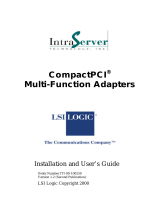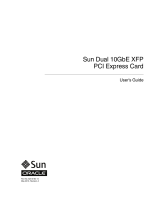Page is loading ...

SunFastEthernetAdapterProductNote
Part No.: 802-1304-10
Revision A, July 1994
Sun Microsystems Computer Corporation
2550 Garcia Avenue
Mountain View, CA 94043
U.S.A.

Please
Recycle
1994 Sun Microsystems, Inc.
2550 Garcia Avenue, MountainView, California 94043-1100 U.S.A.
All rights reserved. This product and related documentation are protectedby copyright and distributed under licenses
restrictingits use, copying, distribution, and decompilation. No part of this productor relateddocumentation may be
reproduced in any form by any means without prior written authorization of Sun and its licensors, if any.
Portions of this productmay be derived from the UNIX
®
and Berkeley 4.3 BSD systems, licensed fromUNIX System
Laboratories, Inc., a wholly owned subsidiary of Novell, Inc., and the University of California, respectively.Third-partyfont
softwarein this product is protected by copyright and licensed from Sun’s font suppliers.
RESTRICTED RIGHTS LEGEND: Use, duplication, or disclosure by the United States Government is subject to the restrictions
set forth in DFARS 252.227-7013 (c)(1)(ii) and FAR 52.227-19.
The product described in this manual may be protectedby one or more U.S. patents, foreign patents, or pending applications.
TRADEMARKS
Sun, the Sun logo, Sun Microsystems, Sun Microsystems Computer Corporation, Solaris, and SunFastEthernet aretrademarks
or registered trademarks of Sun Microsystems, Inc. in the U.S. and certain other countries. UNIX is a registered trademark of
Novell, Inc., in the United States and other countries; X/Open Company,Ltd., is the exclusive licensor of such trademark.
OPEN LOOK
®
is a registeredtrademark of Novell, Inc. PostScript and Display PostScript are trademarks of Adobe Systems,
Inc. All other productnames mentioned herein arethe trademarks of their respective owners.
All SPARC trademarks, including the SCD Compliant Logo, are trademarks or registered trademarks of SPARC International,
Inc. SPARCstation, SPARCserver, SPARCengine, SPARCstorage, SPARCware,SPARCcenter, SPARCclassic, SPARCcluster,
SPARCdesign, SPARC811, SPARCprinter, UltraSPARC, microSPARC,SPARCworks, and SPARCompiler are licensed
exclusively to Sun Microsystems,Inc. Productsbearing SPARC trademarks arebased upon an architecture developed by Sun
Microsystems,Inc.
The OPEN LOOKand Sun™ Graphical User Interfaces were developed by Sun Microsystems,Inc. for its users and licensees.
Sun acknowledges the pioneering efforts of Xerox in researchingand developing the concept of visual or graphical user
interfaces for the computer industry. Sun holds a non-exclusive license fromXerox to the XeroxGraphical User Interface,
which license also covers Sun’s licensees who implement OPEN LOOK GUIs and otherwise comply with Sun’s written license
agreements.
X Window System is a productof the Massachusetts Institute of Technology.
THIS PUBLICATION IS PROVIDED “AS IS” WITHOUT WARRANTY OF ANY KIND, EITHER EXPRESS OR IMPLIED,
INCLUDING, BUT NOT LIMITED TO, THE IMPLIED WARRANTIES OF MERCHANTABILITY, FITNESS FOR A
PARTICULAR PURPOSE, OR NON-INFRINGEMENT.
THIS PUBLICATION COULD INCLUDE TECHNICAL INACCURACIES OR TYPOGRAPHICAL ERRORS. CHANGES ARE
PERIODICALLY ADDED TO THE INFORMATION HEREIN; THESE CHANGES WILL BE INCORPORATED IN NEW
EDITIONS OF THE PUBLICATION. SUN MICROSYSTEMS, INC. MAY MAKE IMPROVEMENTS AND/OR CHANGES IN
THE PRODUCT(S) AND/OR THE PROGRAM(S) DESCRIBED IN THIS PUBLICATION AT ANY TIME.

1
SunFastEthernetAdapter
The following data is in addition to that detailed in the SunFastEthernet
Adapter User Guide, P/N 801-6109-10.
Hardware Requirements
OpenBoot Prom (OBP) version 2.3 is the first OBP version that supports the
SunFastEthernet Adapter. Verify your OBP version by typing the banner
command at the ok prompt. If the OBP version is earlier than 2.3 then the OBP
must be upgraded.
Software Requirements
Solaris 2.3 Hardware: 5/94
Solaris™ 2.3 Hardware: 5/94 is the first Solaris release supporting the
SunFastEthernet Adapter™.
Mandatory Patch Requirements
Patch ID number 101820-01 is required for a SunFastEthernet Adapter when
used with Solaris 2.3 Hardware: 5/94. Contact your local Sun provider.
Solaris 2.3 Hardware: 8/94 or Later
The Solaris 2.3 Hardware: 8/94 software is shipped on a single CD. The CD
software for this distribution is divided into five software packages or clusters
(see following table). The driver for the SunFastEthernet Adapter
(SUNWbmac) is bundled on the “Entire Distribution plus OEM Support” cluster

2 SunFastEthernet Adapter—July 1994
which automatically installs the driver SUNWbmac. For the “Entire
Distribution”, “Programmer” and ”End User Support” clusters, the driver is
installed only if SunFastEthernet Adapter hardware is installed in the system.
If SunFastEthernet hardware was not installed when the Solaris 2.3 Hardware:
8/94 software distribution was installed using one of the last four clusters,
then the driver is not automatically installed via suninstall, instead, the driver
must be installed using the pkgadd command. Refer to “Adding SUNWbmac
using Pkgadd Command”, page 5, in the SunFastEthernet User Guide, P/N
801-6109-10.
Net-Install Servers (Solaris 2.3 Hardware: 5/94 Only)
Note – The Solaris CD cannot be used to do a net-install (read only), thus the
following section is applicable only when the Solaris CD image is archived to a
disk.
To allow net-install over the be interface the be minor-device- number must be
added to your particular architecture’s name_to_major file. To determine the be
minor-device-number proceed as follows:
1. Determine the directory where the Solaris CD image is loaded.
For example, if the Solaris software is located within a directory named DIR,
then type the following:
Table 1 Solaris 2.3 Hardware: 8/94 CD
Cluster Size
Entire Distribution plus OEM Support 298.80 MByte
Entire Distribution 298.1 MByte
Programmer 220Mbyte
End User System Support 125.37 MByte
Core System Support 59.88 MByte
# cd DIR/export/exec/kvm

Diskless Clients (Solaris 2.3 Hardware: 5/94 Only) 3
2. Use the ls command to list the directory contents.
Different directories for supported architectures will be listed.
3. Use the cd command and go to the directory containing your particular
architecture.
4. Type the following line to get a listing for the minor device number for
the be0 device:
The resultant listing will have the following format:
5. For the above example the minor-device-number should be added to the
etc/name_to_major file as follows:
Diskless Clients (Solaris 2.3 Hardware: 5/94 Only)
For support of diskless client booting do the following:
1. Go to your clients root partition and use your favorite editor to add an
entry for the be device to your clients name_to_major file as follows:
# ls -l devices/pseudo/clone@0:be
crw-rw-rw 1 root sys 11,<minor-device number> <date>
/devices/pseudo/clone@0:be
be <minor-device-number>
# cd /export/root/<client name>/etc

4 SunFastEthernet Adapter—July 1994
2. Edit the name_to_major file by adding an entry for the be device.
If the major device number for the last file entry is “n” then use” n+1” for
the be channel major device number. As shown in the example, if the last
entry is qe 104 then use be 105.
3. Copy be driver to clients root partition as follows:
then:
Speed Selection
If you receive the following messages after connecting to a 10 or 100Mbps
network then more than likely the external hub and the SunFastEthernet are
out of sync. In these instances speed selection may be done manually using the
be_speed utility as indicated in the procedure that follows:
This utility is available in the directory /usr/sbin only if patch ID 101820-01 is
installed. This patch is mandatory for the Solaris 2.3 Hardware: 5/94 release;
for the Solaris 2.3 Hardware: 8/94 release the patch is needed only if the
be_speed utility is required.
qec 103
qe 104
be 105
# cd /export/root/<client name>/kernel/drv
# cp /kernel/drv/be .
# 100 Mbps Link Up
Link Down
10 Mbps Link Up
Link Down

Speed Selection 5
To use the utility, type the following at the prompt:
Wherein X is the SunFastEthernet Adapter card number and the arguments
are:
• auto (automatic speed selection)
• 100 (forces 100 Mbps mode)
• 10 (forces 10 Mbps mode)
If no arguments are selected then the current mode (auto or forced) and speed
(10 or 100Mbps) of the interface will be printed.
# /usr/sbin/be_speed beX <arguments>

6 SunFastEthernet Adapter—July 1994
/



